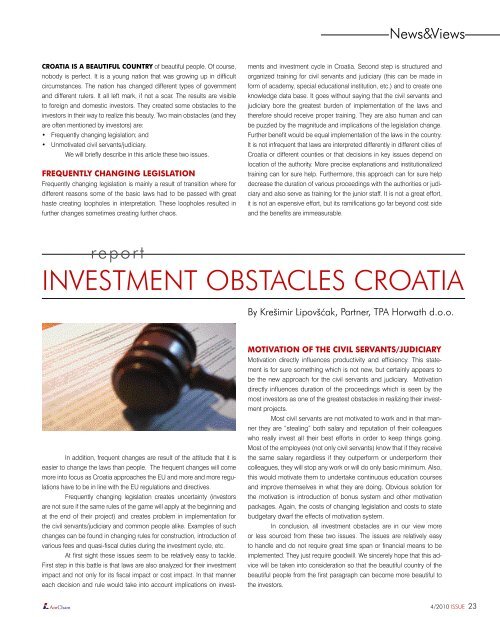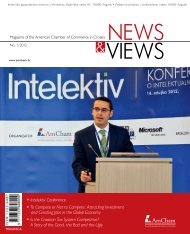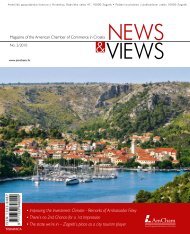Improving the Investment Climate in Croatia ⢠Evening for Safe Steps ...
Improving the Investment Climate in Croatia ⢠Evening for Safe Steps ...
Improving the Investment Climate in Croatia ⢠Evening for Safe Steps ...
- No tags were found...
Create successful ePaper yourself
Turn your PDF publications into a flip-book with our unique Google optimized e-Paper software.
News&Views<strong>Croatia</strong> is a beautiful country of beautiful people. Of course,nobody is perfect. It is a young nation that was grow<strong>in</strong>g up <strong>in</strong> difficultcircumstances. The nation has changed different types of governmentand different rulers. It all left mark, if not a scar. The results are visibleto <strong>for</strong>eign and domestic <strong>in</strong>vestors. They created some obstacles to <strong>the</strong><strong>in</strong>vestors <strong>in</strong> <strong>the</strong>ir way to realize this beauty. Two ma<strong>in</strong> obstacles (and <strong>the</strong>yare often mentioned by <strong>in</strong>vestors) are:• Frequently chang<strong>in</strong>g legislation; and• Unmotivated civil servants/judiciary.We will briefly describe <strong>in</strong> this article <strong>the</strong>se two issues.Frequently chang<strong>in</strong>g legislationFrequently chang<strong>in</strong>g legislation is ma<strong>in</strong>ly a result of transition where <strong>for</strong>different reasons some of <strong>the</strong> basic laws had to be passed with greathaste creat<strong>in</strong>g loopholes <strong>in</strong> <strong>in</strong>terpretation. These loopholes resulted <strong>in</strong>fur<strong>the</strong>r changes sometimes creat<strong>in</strong>g fur<strong>the</strong>r chaos.In addition, frequent changes are result of <strong>the</strong> attitude that it iseasier to change <strong>the</strong> laws than people. The frequent changes will comemore <strong>in</strong>to focus as <strong>Croatia</strong> approaches <strong>the</strong> EU and more and more regulationshave to be <strong>in</strong> l<strong>in</strong>e with <strong>the</strong> EU regulations and directives.Frequently chang<strong>in</strong>g legislation creates uncerta<strong>in</strong>ty (<strong>in</strong>vestorsare not sure if <strong>the</strong> same rules of <strong>the</strong> game will apply at <strong>the</strong> beg<strong>in</strong>n<strong>in</strong>g andat <strong>the</strong> end of <strong>the</strong>ir project) and creates problem <strong>in</strong> implementation <strong>for</strong><strong>the</strong> civil servants/judiciary and common people alike. Examples of suchchanges can be found <strong>in</strong> chang<strong>in</strong>g rules <strong>for</strong> construction, <strong>in</strong>troduction ofvarious fees and quasi-fiscal duties dur<strong>in</strong>g <strong>the</strong> <strong>in</strong>vestment cycle, etc.At first sight <strong>the</strong>se issues seem to be relatively easy to tackle.First step <strong>in</strong> this battle is that laws are also analyzed <strong>for</strong> <strong>the</strong>ir <strong>in</strong>vestmentimpact and not only <strong>for</strong> its fiscal impact or cost impact. In that mannereach decision and rule would take <strong>in</strong>to account implications on <strong>in</strong>vestmentsand <strong>in</strong>vestment cycle <strong>in</strong> <strong>Croatia</strong>. Second step is structured andorganized tra<strong>in</strong><strong>in</strong>g <strong>for</strong> civil servants and judiciary (this can be made <strong>in</strong><strong>for</strong>m of academy, special educational <strong>in</strong>stitution, etc.) and to create oneknowledge data base. It goes without say<strong>in</strong>g that <strong>the</strong> civil servants andjudiciary bore <strong>the</strong> greatest burden of implementation of <strong>the</strong> laws and<strong>the</strong>re<strong>for</strong>e should receive proper tra<strong>in</strong><strong>in</strong>g. They are also human and canbe puzzled by <strong>the</strong> magnitude and implications of <strong>the</strong> legislation change.Fur<strong>the</strong>r benefit would be equal implementation of <strong>the</strong> laws <strong>in</strong> <strong>the</strong> country.It is not <strong>in</strong>frequent that laws are <strong>in</strong>terpreted differently <strong>in</strong> different cities of<strong>Croatia</strong> or different counties or that decisions <strong>in</strong> key issues depend onlocation of <strong>the</strong> authority. More precise explanations and <strong>in</strong>stitutionalizedtra<strong>in</strong><strong>in</strong>g can <strong>for</strong> sure help. Fur<strong>the</strong>rmore, this approach can <strong>for</strong> sure helpdecrease <strong>the</strong> duration of various proceed<strong>in</strong>gs with <strong>the</strong> authorities or judiciaryand also serve as tra<strong>in</strong><strong>in</strong>g <strong>for</strong> <strong>the</strong> junior staff. It is not a great ef<strong>for</strong>t,it is not an expensive ef<strong>for</strong>t, but its ramifications go far beyond cost sideand <strong>the</strong> benefits are immeasurable.report<strong>Investment</strong> obstacles <strong>Croatia</strong>By Krešimir Lipovšćak, Partner, TPA Horwath d.o.o.Motivation of <strong>the</strong> civil servants/judiciaryMotivation directly <strong>in</strong>fluences productivity and efficiency. This statementis <strong>for</strong> sure someth<strong>in</strong>g which is not new, but certa<strong>in</strong>ly appears tobe <strong>the</strong> new approach <strong>for</strong> <strong>the</strong> civil servants and judiciary. Motivationdirectly <strong>in</strong>fluences duration of <strong>the</strong> proceed<strong>in</strong>gs which is seen by <strong>the</strong>most <strong>in</strong>vestors as one of <strong>the</strong> greatest obstacles <strong>in</strong> realiz<strong>in</strong>g <strong>the</strong>ir <strong>in</strong>vestmentprojects.Most civil servants are not motivated to work and <strong>in</strong> that manner<strong>the</strong>y are “steal<strong>in</strong>g” both salary and reputation of <strong>the</strong>ir colleagueswho really <strong>in</strong>vest all <strong>the</strong>ir best ef<strong>for</strong>ts <strong>in</strong> order to keep th<strong>in</strong>gs go<strong>in</strong>g.Most of <strong>the</strong> employees (not only civil servants) know that if <strong>the</strong>y receive<strong>the</strong> same salary regardless if <strong>the</strong>y outper<strong>for</strong>m or underper<strong>for</strong>m <strong>the</strong>ircolleagues, <strong>the</strong>y will stop any work or will do only basic m<strong>in</strong>imum. Also,this would motivate <strong>the</strong>m to undertake cont<strong>in</strong>uous education coursesand improve <strong>the</strong>mselves <strong>in</strong> what <strong>the</strong>y are do<strong>in</strong>g. Obvious solution <strong>for</strong><strong>the</strong> motivation is <strong>in</strong>troduction of bonus system and o<strong>the</strong>r motivationpackages. Aga<strong>in</strong>, <strong>the</strong> costs of chang<strong>in</strong>g legislation and costs to statebudgetary dwarf <strong>the</strong> effects of motivation system.In conclusion, all <strong>in</strong>vestment obstacles are <strong>in</strong> our view moreor less sourced from <strong>the</strong>se two issues. The issues are relatively easyto handle and do not require great time span or f<strong>in</strong>ancial means to beimplemented. They just require goodwill. We s<strong>in</strong>cerely hope that this advicewill be taken <strong>in</strong>to consideration so that <strong>the</strong> beautiful country of <strong>the</strong>beautiful people from <strong>the</strong> first paragraph can become more beautiful to<strong>the</strong> <strong>in</strong>vestors.4/2010 ISSUE 23













